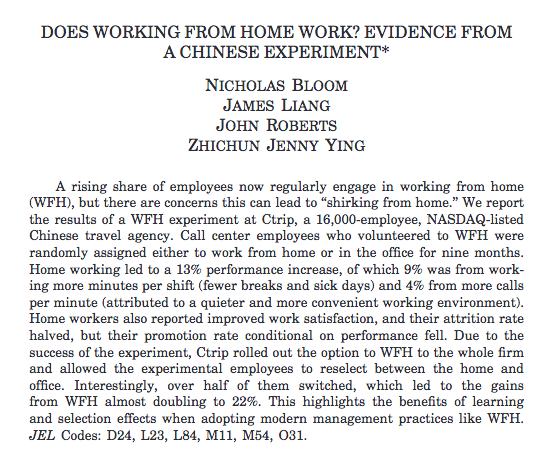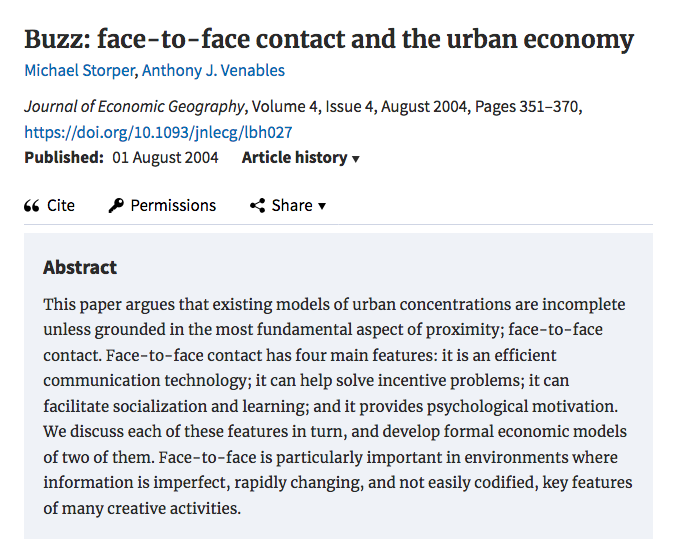There& #39;s a lot of chat about that a shift to remote working triggering & #39;the end of big cities& #39;.
Or more realistically: big shifts in some kinds of work out of large cities, with an unspecified set of negative consequences for those places and people in them ...
Or more realistically: big shifts in some kinds of work out of large cities, with an unspecified set of negative consequences for those places and people in them ...
This kind of discussion is - by definition - highly speculative. Much of it also seems off-beam to me. So in that spirit ...
It& #39;s worth noting that some of the leading academics are pretty split on this issue - and many don& #39;t have strongly held views one way or the other https://twitter.com/mitsmr/status/1262822335972851712">https://twitter.com/mitsmr/st...
On WFH: as @JedKolko points out here, around 2/3 of jobs in the US can& #39;t be fully done from home. Figures for the UK are similar. https://twitter.com/JedKolko/status/1266004019165532162?s=20">https://twitter.com/JedKolko/...
So will this always be a limited phenomenon? Not necessarily, if current trends continue - more people spending some time at home, some time at work ...
https://www.ons.gov.uk/employmentandlabourmarket/peopleinwork/employmentandemployeetypes/articles/coronavirusandhomeworkingintheuklabourmarket/2019">https://www.ons.gov.uk/employmen...
https://www.ons.gov.uk/employmentandlabourmarket/peopleinwork/employmentandemployeetypes/articles/coronavirusandhomeworkingintheuklabourmarket/2019">https://www.ons.gov.uk/employmen...
But as that ONS study shows, not everyone gets that option - younger people, BAME people, people with lower qualifications are less likely to have WFH in the mix.
There& #39;s an immediate equity issue here that& #39;s not talked about enough.
There& #39;s an immediate equity issue here that& #39;s not talked about enough.
What about the impacts? Some studies suggest that remote working raises productivity, at least for & #39;routine& #39; tasks ...
https://nbloom.people.stanford.edu/sites/g/files/sbiybj4746/f/wfh.pdf">https://nbloom.people.stanford.edu/sites/g/f...
https://nbloom.people.stanford.edu/sites/g/files/sbiybj4746/f/wfh.pdf">https://nbloom.people.stanford.edu/sites/g/f...
There& #39;s also more suggestive evidence like this study, on virtual communities, which suggests serious knowledge-intensive collaboration can be done online.
https://www.researchgate.net/profile/Gernot_Grabher/publication/277454022_Distance_as_asset_Knowledge_collaboration_in_hybrid_virtual_communities/links/55881baf08ae65ae5a4e19a3/Distance-as-asset-Knowledge-collaboration-in-hybrid-virtual-communities.pdf">https://www.researchgate.net/profile/G...
https://www.researchgate.net/profile/Gernot_Grabher/publication/277454022_Distance_as_asset_Knowledge_collaboration_in_hybrid_virtual_communities/links/55881baf08ae65ae5a4e19a3/Distance-as-asset-Knowledge-collaboration-in-hybrid-virtual-communities.pdf">https://www.researchgate.net/profile/G...
Happily for researchers, a bunch of big US tech firms - most notably Facebook - are about to hard-test this hypothesis (though even FB are only planning to put ~50% of workers remote, in drop-in-type environments). https://www.theverge.com/facebook/2020/5/21/21265699/facebook-remote-work-shift-workforce-permanent-covid-19-mark-zuckerberg-interview">https://www.theverge.com/facebook/...
Frankly, it& #39;s hard to disentangle moves like this from things Bay Area tech firms would be planning anyway, given the region& #39;s terrible housing crisis. It& #39;s unclear whether the same drivers are in play outside tech.
Contra all of that, current remote working tech isn& #39;t a full substitute for face to face, and seems clearly inferior for some things. https://theconversation.com/finding-endless-video-calls-exhausting-youre-not-alone-137936">https://theconversation.com/finding-e...
The history of innovations suggests that these kind of & #39;good enough& #39; products often cut through. Perhaps that will happen here. But rn, health risks aside, the evidence suggests most people will prefer face to face interaction where they can.
We also know that microgeographies really do matter for ideas generation and innovation - see these @whatworksgrowth reviews on researcher co-location and accelerator programmes.
https://whatworksgrowth.org/resources/policies-to-encourage-co-location-of-researchers/
https://whatworksgrowth.org/resources... href=" https://whatworksgrowth.org/resources/business-advice-toolkit-accelerators/">https://whatworksgrowth.org/resources...
https://whatworksgrowth.org/resources/policies-to-encourage-co-location-of-researchers/
One way to think about research labs and accelerators is as cities in miniature. This @centreforcities podcast is a really great intro to the cities and interactions field. These are powerful forces that aren& #39;t easily unravelled. https://www.centreforcities.org/podcast/city-talks-face-to-face-interaction-and-why-cities-still-matter-in-the-information-age/">https://www.centreforcities.org/podcast/c...
You should also read this majesterial 2004 paper from @michaelstorper and Tony Venables.
http://eprints.lse.ac.uk/20008/1/Buzz_Face-to-Face_Contact_and_the_Urban_Economy.pdf">https://eprints.lse.ac.uk/20008/1/B...
http://eprints.lse.ac.uk/20008/1/Buzz_Face-to-Face_Contact_and_the_Urban_Economy.pdf">https://eprints.lse.ac.uk/20008/1/B...
Overall: there are a number of shifters affecting big cities rn. More remote working is just one of them. I don& #39;t *think* any of these are big enough to unravel big cities - at least in the short term. It& #39;s a new set of frictions in urban life, not a rebalancing.
That said - if globalised pandemics do become much more commonplace, we can imagine a more permanent set of economic shifts which will have profound, negative implications for cities and the people who live in them.

 Read on Twitter
Read on Twitter




